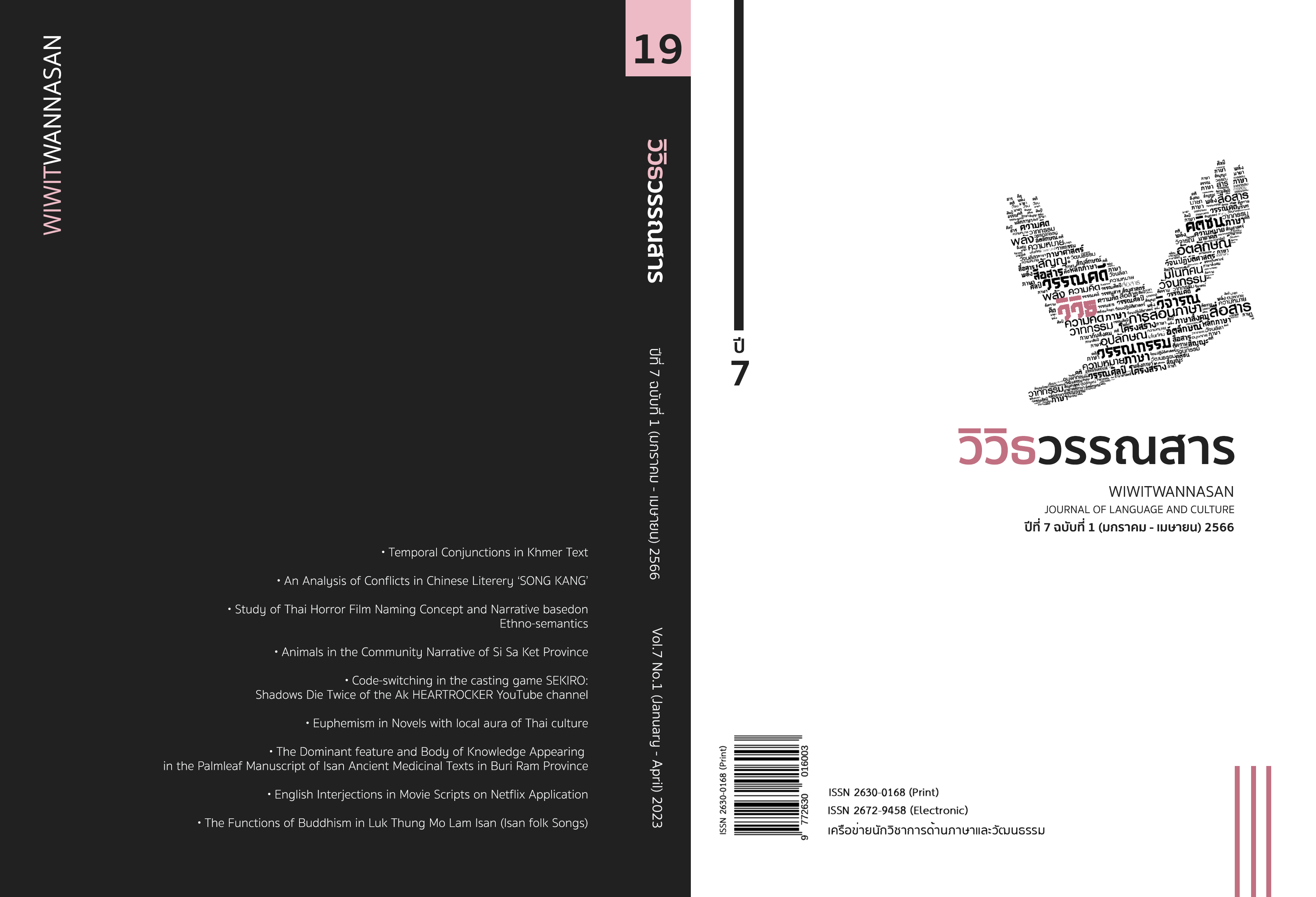การวิเคราะห์ปมขัดแย้งในวรรณกรรมจีนเรื่องซ้องกั๋ง
Main Article Content
บทคัดย่อ
วรรณกรรมเรื่อง “ซ้องกั๋ง” เป็นหนึ่งในสี่สุดยอดวรรณกรรมของจีนซึ่งมีกลวิธีการผูกโครงเรื่องที่น่าติดตาม โดยเฉพาะการสร้างปมขัดแย้งที่ทำให้ผู้อ่านสนใจการคลายปมปัญหาของตัวละครในแต่ละคราว การสร้างปมขัดแย้งที่ปรากฏในวรรณกรรมจีนเรื่องซ้องกั๋งทั้ง 104 ตัวอย่างนั้น ปรากฏทั้งสิ้น 5 ประเภท โดยแจกแจกความถี่ค่าร้อยละ ได้แก่ ความขัดแย้งระหว่างมนุษย์กับธรรมชาติ ร้อยละ 2.88 ความขัดแย้งระหว่างมนุษย์กับมนุษย์ ร้อยละ 90.38 ความขัดแย้งระหว่างมนุษย์กับสังคม ร้อยละ 0.96 ความขัดแย้งระหว่างมนุษย์กับอำนาจเหนือธรรมชาติ ร้อยละ 3.85 และความขัดแย้งทางจิตใจ ร้อยละ 1.92 ตามลำดับ แสดงให้เห็นว่าตัวละครมีโอกาสขัดแย้งกับตัวละครด้วยกันมากที่สุด
Article Details

อนุญาตภายใต้เงื่อนไข Creative Commons Attribution-NonCommercial-NoDerivatives 4.0 International License.
ลิขสิทธิ์ของบทความเป็นของวารสาร การพิมพ์ซ้ำจะต้องได้ร้บการอนุญาตจากบรรณาธิการวารสาร
เอกสารอ้างอิง
Bamrungthai, W. (2001). Science and Art of Fiction. Bangkok : Suweeriyasan. (In Thai)
Chaisilwattana, Y. (1999). Introduction of Literature. Bangkok : Thammasat University. (In Thai)
Chalita, 2012. “An analysis of the Conflict appearing in the 2010, Short Story of Chor Karaket” in Liberal Arts Review. Vol. 7 No. 13 (January – June). (In Thai)
Chiewyudt, C. [translator]. (2009). Song Kang, T he Marshes of Mount Liang. Bangkok : Saengdao. (In Thai)
Chongtrakul, S. (1980) Analytical literature. Thai Department, Srinakarinwirot University, Mahasarakham. (In Thai)
Homfung, C. “The problem solving of characters’ conflict in prose plays of King Rama VI : the analysis based on the four noble truths” Master of Arts, Department of Thai, Silpakorn University, 2011. (In Thai)
Jarunggidanan, W. (1995). Science of short stories and fiction. Bangkok : Rung Ruang Sarn Press. (In Thai)
Jitjumnong, D. (1997). Values and Distinctive Characters of Thai Literature in the Early Rattanakosin. Bangkok : Thammasat University. (In Thai)
Kanniga, R. (2016). The conflicts of main characters in seawrite litteratures. Master of Arts (Thai) Graduate school, Chiang Mai Rajabhat University. (In Thai)
Manivat, V. (1972). The face of the author. Bangkok : Kawna Press. (In Thai)
Manlikamas, K. (1979). Literary Criticism. Bangkok : Ramkhamhaeng University Press. (In Thai)
Newstrom, John W. (2015). Organizational Behavior: Human Behavior at Work (14th Edition), New York, N. Y.: McGraw-Hill Education. (In English)
Nukulkit, S. (No date). Teaching documents for the Literary Criticism course. Faculty of Education Srinakarinwirot University. (In Thai)
Phanomprairat, A. (1999) “A comparison of Shui Hu Zhuan and Song Kang”. Master of Arts (Chinese) Chulalongkorn University. (In Thai)
Ralph H. Kilmann. TAKE THE THOMAS-KILMANN CONFLICT MODE INSTRUMENT (TKI) from https://kilmanndiagnostics.com/overview-thomas-kilmann-conflict-mode-instrument-tki/ on [August 30, 2021] (In English)
Satavethin, J. (1975). Literature and Literary Criticism. Bangkok : SUTHISARN PRESS. (In Thai)
Somdet Chaophraya Sri Suriwongse. (2018). Song Kang. Bangkok : Bansomdejchaopraya Rajabhat University. (In Thai)
Somdet Chaophraya Sri Suriwongse. (1971). Song Kang. Thonburi : SilpaBannakan. (In Thai)
Somdet Chaophraya Sri Suriwongse. (No date). Song Kang. Vajirayana Online. (In Thai)
Sujjapun, R. (1995). literature review. Bangkok : Nabaanwannagum. (In Thai)
Thompson, Tonya. Decoding the Six Conflicts in Literature from https://www.servicescape.com/blog/decoding-the-six-conflicts-in-literature-with-examples on [September 4, 2021] (In English)
Thongsai, A. “An Analysis of Conflicts in The Literary Translation, Twilight”. Journal of Humanities Naresuan University 2013. 10 (1) January - April. (In Thai)


